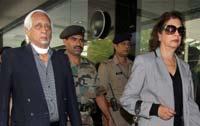Assassination attempt linked to rise in militancy

Is the Khalistan movement still alive?
Should a memorial be built at the Golden Temple in Amritsar in memory of the militants who died during Operation Bluestar in 1984?
The troubling questions were back with the recent assassination attempt in London on Lt. Gen. (retd) K.S. Brar, who led the Indian Army operation into the Golden Temple 28 years ago.
Thirteen people have been arrested in connection with the attack on Brar.
Two other men have appeared in court charged with wounding with intent to do grievous bodily harm on the retired officer.
Barjinder Singh Sangha, 33, of Wolverhampton, and Mandeep Singh Sandhu, 34 of Great Barr, Birmingham, appeared at Westminster Magistrates Court earlier.
Singh Sangha is also charged with common assault in relation to Mr Singh Brar's wife Meena.
The suspects were arrested by counter-terrorism officers following searches at addresses in London and the Midlands.
Brar's statement that the attack was the handiwork of Khalistani activists has brought the focus back on Punjab.
Following the London attack on Brar, 78, who gets 'Z' category security in India as he is on the hit-list of Khalistani militants, openly blamed the Punjab government, led by the Akali Dal, for encouraging fringe Khalistani elements by allowing a memorial to be built in June this year for "martyrs" of the 1984 Operation Bluestar. Brar has been opposed to the memorial.
Operation Bluestar was conducted by the army to flush out heavily armed militants from inside the Golden Temple complex in Amritsar, 250 km from here. The complex, except for the sanctum sanctorum, suffered heavy damage.
Dal Khalsa leader Kanwarpal Singh blamed Brar for linking the London attack to the raising of the memorial.
"He is trying to become a hero by raising the memorial issue," Kanwarpal Singh said.
Another radical leader, who sought to remain anonymous, said the attack could be a "staged drama".
While the Akali Dal, which indirectly controls the SGPC, had washed its hands off the memorial, saying it has nothing to do with it, its alliance partner Bharatiya Janata Party (BJP) had opposed the memorial.
"There are certain fringe elements still in Britain, Canada and the US who try to keep the Khalistan issue alive. The London attack could be linked to that. Punjab Police officers who are on the hit list, take precautions when travelling to these countries," a senior police officer told IANS.
Punjab saw a blood-stained phase of Sikh militancy between 1981-1992 as separatist elements resorted to violence to demand Khalistan (land of the pure) - a homeland for Sikhs. Even though the Khalistan movement is nowhere active in the state, certain radical elements and groups have unsuccessfully tried to revive it in the last nearly two decades.
Meanwhile, Vancouver Sikhs are hoping the shrine being built in India’s Golden Temple will maintain its intended purpose of commemorating the defenders and innocent killed during the army’s 1984 Operation Blue Star.
“We were very supportive of this in the first place,” Canadian Sikh Coalition spokesman, Moninder Singh, told Vancouverdesi.com.
According to Singh, the government granted the building of the shrine over a year and a half ago, with the intention of honouring the thousands of Sikhs killed across India in the army operation, which attacked Sikhs worshiping inside the Golden Temple and many innocent civilians.
Singh refers to it as a “state sponsored genocide.”
“The rest of the Sikhs that lived across India really had nothing to do with it and they were the ones eventually caught in that cross fire,” he said. “So it was supposed to be just for them.”
But now “mixed things” are being heard about the shrine’s purpose.
According to the Times of India, Punjab Deputy Chief Minister Sukhbir Singh Badal said it would be a simple Gurdwara (sikh shrine) and nothing else.
“We’re not 100 per cent sure what’s true right now,” said Singh. “Initially reports were that this shrine was to be dedicated to the defenders and innocent who lost their lives there and specifically not for the invaders and not for any Indian army,” which is what the CSC supports.
“Now the opposite is being said by the Sikh bodies themselves – that the shrine is just a temple made in memory of that whole event.”
According to Singh, those building the shrine, the Shiromani Gurudwara Parbhandhak Committee (SGPC), took on the project expecting it to be in the memory of militants and devotees killed.
If the intention has in fact changed, Singh speculates it was an election ploy to gain more supporters and now the political party is trying to “tone it down.”
“(But) the change hasn’t been confirmed any which way,” he said, adding that “only time will tell.”
Head priest at the Ross St. Temple, Harminder Singh, believed the original intention was still in place.
“(It should be) dedicated to those who lost their lives … who came for devotion,” he told Vancouverdesi.com. “If the community is going to build a memorial in their memory that should be appreciated.”
Harminder said if the political party wants to build a shrine for everyone involved in the event – including the army – a separate memorial should be built.
Leave a comment









